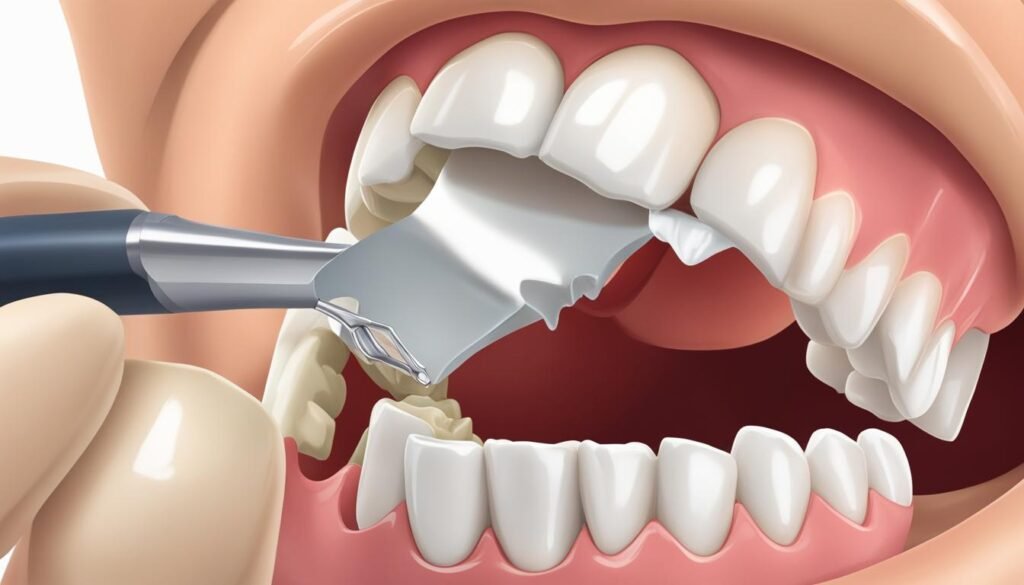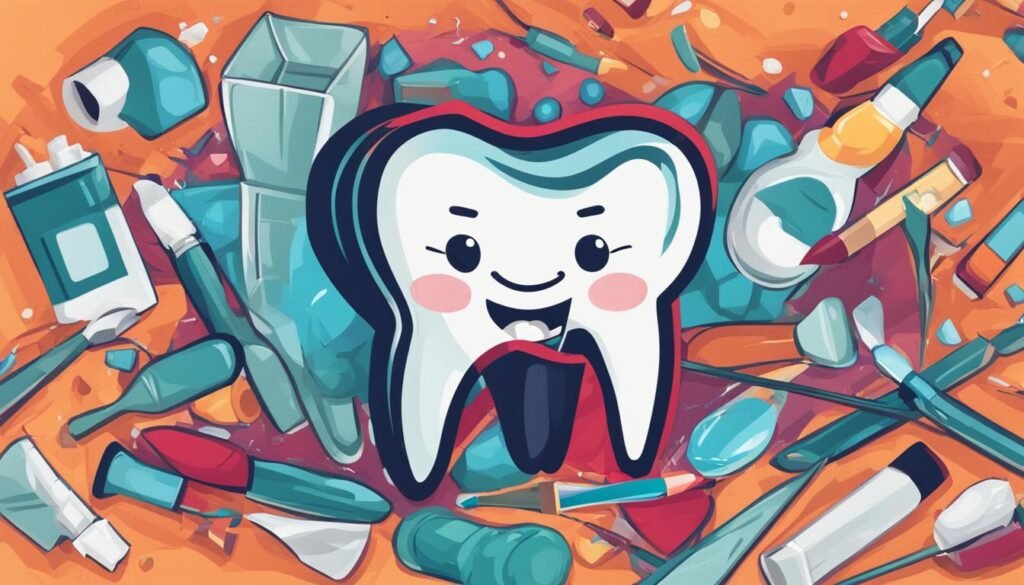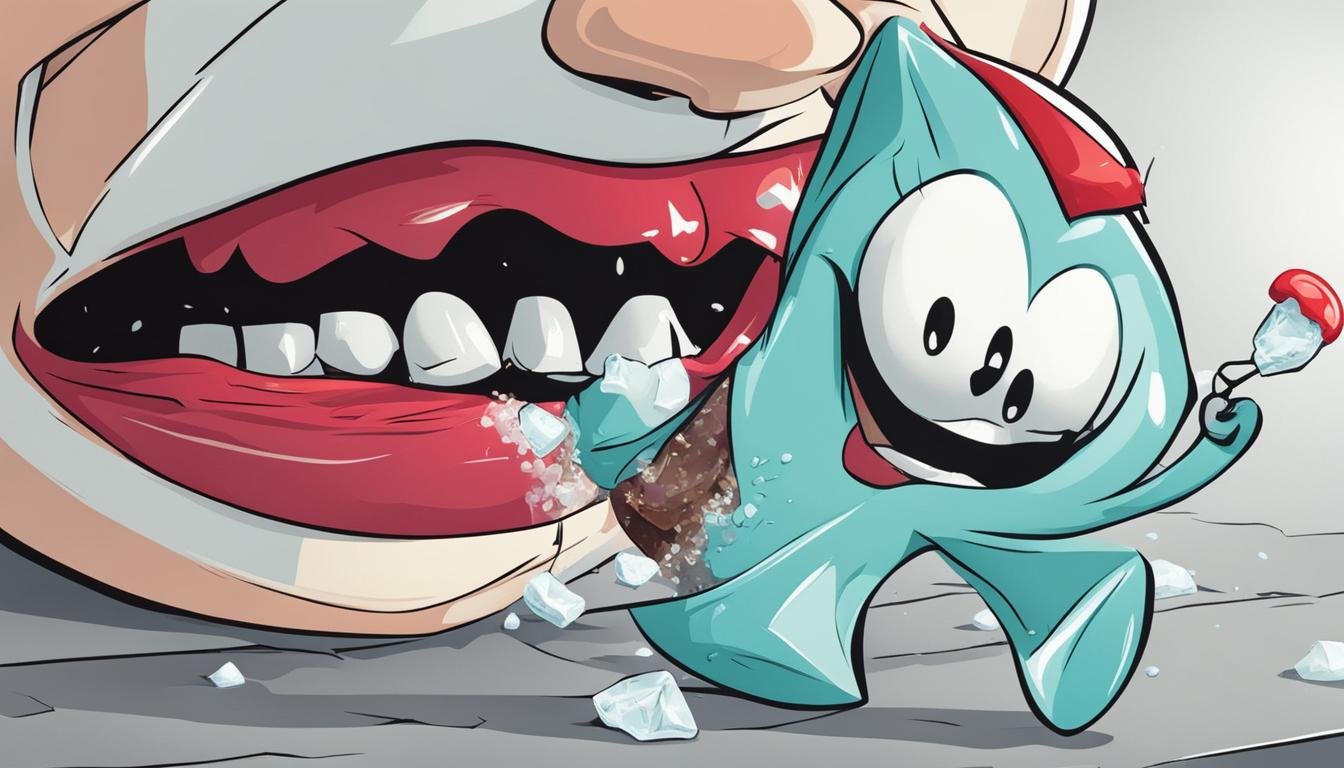Are you constantly dealing with chipped teeth and wondering why it keeps happening? Chipped teeth can be a common dental issue that can cause discomfort and affect the appearance of your smile. Understanding the causes of chipped teeth and how to prevent them is essential for maintaining your dental health.
Key Takeaways:
- Chipped teeth can result from facial injuries, biting down on hard objects, enamel weakness, poor oral hygiene, and teeth grinding.
- Preventing chipped teeth requires maintaining good oral hygiene practices, wearing protective mouthguards, and avoiding hard and acidic foods.
- Treatment options for chipped teeth include tooth bonding, porcelain veneers, dental crowns, and root canal treatment in severe cases.
- Maintaining dental health and preventing chipped teeth involves regular dental checkups, following a balanced diet, and avoiding harmful habits.
- Prioritizing dental health and seeking timely treatment can help prevent chipped teeth and maintain overall oral health.
Prevention Tips for Chipped Teeth
To reduce the risk of chipping teeth, it is important to maintain good oral hygiene practices. This includes brushing twice a day with non-abrasive fluoride toothpaste, using a soft toothbrush, and flossing before bed. By following these simple steps, you can keep your teeth clean and healthy, reducing the chances of chipping.
Another way to protect your teeth from chipping is to use a mouthguard. If you grind your teeth at night, wearing a nightguard can provide a barrier between your upper and lower teeth, helping to prevent dental trauma. Similarly, if you participate in sports or other physical activities, wearing a mouthguard can protect your teeth from any impact or injury that may occur.
Here are some additional prevention tips to protect your teeth from chipping:
- Avoid biting down on hard objects such as ice, hard candies, or pens, as this can put excessive pressure on your teeth and increase the risk of chipping.
- Limit your consumption of acidic foods and drinks, as the acid can erode the enamel and weaken your teeth.
- Maintain a healthy diet rich in calcium and vitamin D, as these nutrients are essential for strong and healthy teeth.
- Stay hydrated throughout the day to promote saliva production and prevent dry mouth, as dry mouth can contribute to enamel weakness.
Lastly, it is important to visit your dentist regularly for checkups and cleanings. Your dentist can identify any potential issues early on and provide necessary treatments or recommendations to prevent chipping. By following these prevention tips and maintaining good dental habits, you can significantly reduce the risk of chipped teeth and maintain a healthy smile.
Treatment Options for Chipped Teeth
When it comes to treating chipped teeth, there are several options available depending on the severity of the chip. For minor chips, the dentist may be able to simply smooth and polish the affected area, restoring the tooth’s appearance without further intervention. However, for larger chips, additional treatment may be necessary to restore both the aesthetics and functionality of the tooth.
1. Tooth Bonding
One popular treatment option for chipped teeth is tooth bonding. This procedure involves the application of a tooth-colored resin to the chipped area, which is then shaped and polished to match the natural contours of the tooth. Tooth bonding is a quick and cost-effective solution that provides immediate results, making it an attractive option for many patients.
2. Porcelain Veneers
In cases where the chip is more extensive or affects the front surface of the tooth, porcelain veneers may be recommended. These thin shells, made from medical-grade ceramic material, are custom-made to fit over the front of the tooth. Porcelain veneers not only restore the appearance of chipped teeth but also provide additional strength and protection.
3. Dental Crown
For more severe chips or cases where the structural integrity of the tooth is compromised, a dental crown may be the best treatment option. A dental crown is a custom-made cap that completely covers the damaged tooth, providing strength, protection, and aesthetic improvement. This option is particularly beneficial for posterior teeth that bear the brunt of chewing forces.
It’s important to note that the appropriate treatment option will depend on the individual case and should be determined by a qualified dentist. Seeking prompt dental care is crucial to prevent further complications and ensure the most effective course of action for restoring chipped teeth.

Maintaining Dental Health and Preventing Chipped Teeth
When it comes to preserving your dental health and preventing chipped teeth, there are several important steps you can take. In addition to following a regular oral hygiene routine, there are specific habits that can help protect your enamel and maintain healthy teeth.
Enamel Protection Tips:
- Avoid chewing on hard objects such as ice, pens, or fingernails, as this can weaken and chip your teeth.
- Limit your consumption of acidic foods and drinks like citrus fruits, sodas, and sports drinks, as they can erode tooth enamel over time.
- Use a straw when drinking acidic beverages to minimize contact with your teeth.
- Brush your teeth gently with a soft-bristled toothbrush and non-abrasive fluoride toothpaste to avoid wearing down the enamel.
- Consider using a fluoride mouthwash to strengthen your teeth and protect against decay.
In addition to these enamel protection tips, there are several healthy teeth habits you can adopt to prevent chipping and maintain optimal dental health:
Healthy Teeth Habits:
- Practice regular dental checkups and professional cleanings to identify any potential issues early on and address them promptly.
- Follow a balanced diet that includes plenty of fruits, vegetables, and calcium-rich foods to support strong teeth.
- Avoid smoking or using tobacco products, as they can cause tooth discoloration and contribute to gum disease.
- If you grind your teeth while sleeping, consider wearing a nightguard to protect your teeth from excessive wear and chipping.
- Wear a mouthguard during sports activities to shield your teeth from potential trauma or injury.
By incorporating these enamel protection tips and healthy teeth habits into your daily routine, you can significantly reduce the risk of chipped teeth and maintain a healthy, confident smile.

Conclusion
Taking care of your dental health is essential for preventing chipped teeth and maintaining a healthy smile. By following good oral hygiene practices, protecting your enamel, and seeking timely dental treatment, you can reduce the risk of chipping and ensure overall oral health.
Regular dental checkups and cleanings play a key role in identifying potential issues early on and addressing them before they escalate. Along with preventive measures like wearing mouthguards during sports activities or while grinding your teeth, these steps can help protect your teeth from trauma and minimize the chances of chipped teeth.
In the event of chipped teeth, prompt treatment is crucial to prevent further complications. Dental bonding, porcelain veneers, and dental crowns are effective options for restoring chipped teeth, providing both aesthetic and functional benefits. By prioritizing your dental health and seeking appropriate treatment, you can regain a confident smile and maintain healthy teeth.
Remember, prevention is always better than cure. By prioritizing dental health, practicing good oral hygiene habits, and minimizing habits that can weaken your enamel, such as chewing on hard objects or consuming acidic foods, you can significantly reduce the risk of chipped teeth. By maintaining a healthy lifestyle and seeking regular dental care, you can enjoy a beautiful and healthy smile for years to come.
FAQ
Why do my teeth keep chipping?
Teeth can chip or break due to various reasons, including facial injuries, biting down on hard objects, enamel weakness, poor oral hygiene, cavities, decay, large fillings, acidic foods, dry mouth, age-related enamel weakening, and teeth grinding.
How can I prevent chipped teeth?
To reduce the risk of chipping teeth, it is important to maintain good oral hygiene practices, such as brushing twice a day with non-abrasive fluoride toothpaste and using a soft toothbrush. Flossing before bed, using an alcohol-free fluoride mouthwash, wearing a nightguard if you grind your teeth, and a mouthguard if you play sports can also help protect against dental trauma. Avoiding hard and acidic foods, practicing a healthy diet, and visiting the dentist regularly for checkups and cleanings are also important preventive measures.
What are the treatment options for chipped teeth?
The type of treatment recommended depends on the severity of the chip. Minor chips can often be smoothed and polished. Larger chips may require tooth bonding, where a tooth-colored resin is applied to the chipped area and shaped to restore the tooth’s appearance. Alternatively, porcelain veneers can be used to cover the front surface of the tooth. For more extensive damage, a dental crown may be necessary to provide full coverage and protection. Root canal treatment may be required if the chip extends into the nerve of the tooth. Seeking prompt dental care is essential to prevent further complications and ensure appropriate treatment.
How can I maintain dental health and prevent chipped teeth?
Taking care of your dental health is crucial in preventing chipped teeth. In addition to following good oral hygiene habits, it is important to protect your enamel by avoiding habits that can weaken it, such as chewing on hard objects or consuming acidic foods and drinks. Regular dental checkups and cleanings can help identify potential issues and address them promptly. By maintaining a healthy lifestyle, including a balanced diet and avoiding harmful habits like teeth grinding, you can minimize the risk of chipped teeth.
What is the importance of dental health and preventing chipped teeth?
Chipped teeth can result from various causes, including trauma, enamel weakness, poor oral hygiene, and aging. However, by practicing good oral care, protecting your teeth, and seeking timely dental treatment, you can prevent chipping and maintain a healthy smile. Regular dental checkups, preventive measures like wearing mouthguards, and appropriate treatment options like dental bonding or crowns can help restore chipped teeth and prevent further complications. Prioritizing your dental health and following preventive measures are essential in reducing the risk of chipped teeth and maintaining overall oral health.

